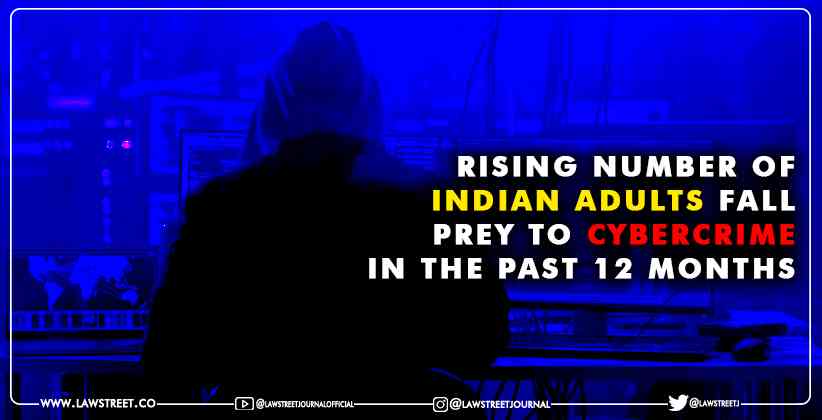Due to Covid-19, there was a significant spike in cyber crimes with more than 27 million Indian adults experiencing identity theft in the past 12 months.
According to a recent study on Child Safety on Children and Adolescents, 9.2% of the 630 adolescents in Delhi and the National Capital Region (NR) faced online harassment or cyberbullying. But, half of them (4.6%) did not report it to the cyber cell.
India stands third in the world for the number of cybercrimes cases at over 2,900, as per the Internet Crime Report for 2019 by the Federal Bureau of Investigation. The FBI report reveals that the most common mode of cybercrime or fraud is emails, followed by text messages and via fake websites.
Cybercrime is becoming a major issue. Cases of cybercrime are increasing day by day, especially during the covid 19 pandemic.
Surprisingly people who are more affected by cybercrime frauds are adults. One of the main reasons for such a rapid increase in the cases of cybercrime is a dependency on the internet, even for the most basic things like shopping, making payments, ordering food, etc. Where there is such uncontrollable dependency some people out there are going to take benefit of it.
As per Norton Cyber Safety Insights Report, which conducted an online survey in partnership with The Harris Poll, seven in 10 Indian adults (70 percent) believe that remote work has made it much easier for hackers and cybercriminals to take advantage of them.
52 percent of Indian adults said that they do not know how to protect themselves from cybercrime. The survey involved more than 10,000 adults in 10 countries including 1,000 adults in India.
Further, according to the Delhi police report, during the Covid-19 induced lockdown with as many as 135 such offenses being reported every day on an average in May nearly 33,000 cases registered until November last year in the national capital.
The cybercrime unit has analyzed that 62% of these offenses were online financial frauds, 24% were social media harassment that included morphing photos of people and sexual harassment, and the rest 14% were other crimes such as hacking, identity theft, and data theft.
As per Anyesh Roy, deputy commissioner of police (cybercrime unit), "Many bogus sites with poor credibility cropped up to take advantage of people who had increased their use of digital platforms for shopping. Under normal circumstances, the public wouldnt have generally used those sites for shopping".
Eugene Kaspersky, CEO at Kaspersky, also added that We see a growing number of cyber gangs, unfortunately, we see a lot of junior cybercriminals, they generate a lot of the malicious attacks, that is rather easy to protect the customers from, but they are learning and gaining experience and joining the professional cyber gangs and they are shifting from the traditional smartphones and computers to the internet and the industrial sector.
Remarking on this, Union Minister of State for Home G Kishan Reddy said that the Ministry of Home Affairs operationalized the National Cyber Crime Reporting Portal on August 30, 2019, to provide a centralized mechanism to the citizens for online reporting of all types of cybercrime incidents, with a special focus on cybercrimes against women and children.
As per the data maintained, since its inception 3,17,439 cybercrime incidents and 5,771 FIRs have been registered up to February 28, 2021, in the country which includes, 21,562 cybercrime incidents and 87 FIRs in Karnataka and 50,806 cybercrime incidents, and 534 FIRs in Maharashtra," he added.
In a bid to keep an eye on the cyber world in a "coordinated and comprehensive manner", the government has asked common people to register as cybercrime volunteers to help check posts against the sovereignty of the nation, on child and women abuse and attempts to disturb the law-and-order situation. The project known as the Indian Cyber Crime Coordination Centre (I4C) is an initiative of the Union Ministry.
Additionally, due to the increase in the number of cybercrime cases about 13000 personnel of Delhi police have been trained through video-conferencing as part of the police force's decisive measures against crime. Multiple sessions were conducted for police personnel on internet protocol details record (IPDR) analysis, crypto-currency fraud investigation, and investigation of fraud using new financial instruments such UPI, QR Code, etc.
Along with these steps, the government also introduced Cybersecurity Policies such as the follows:
- The Indian Computer Emergency Response Team (CERT-In), which operates as the national agency for tackling the countrys cybersecurity
- National Critical Information Infrastructure Protection Centre. This was amended as per the provisions of section 70A of the Information Technology (IT) Act, 2000
- The Ministry of Electronics and Information Technology (MeitY) has launched the Cyber Surakshit Bharat initiative. This program was in association with the National e-Governance Division (NeGD).








